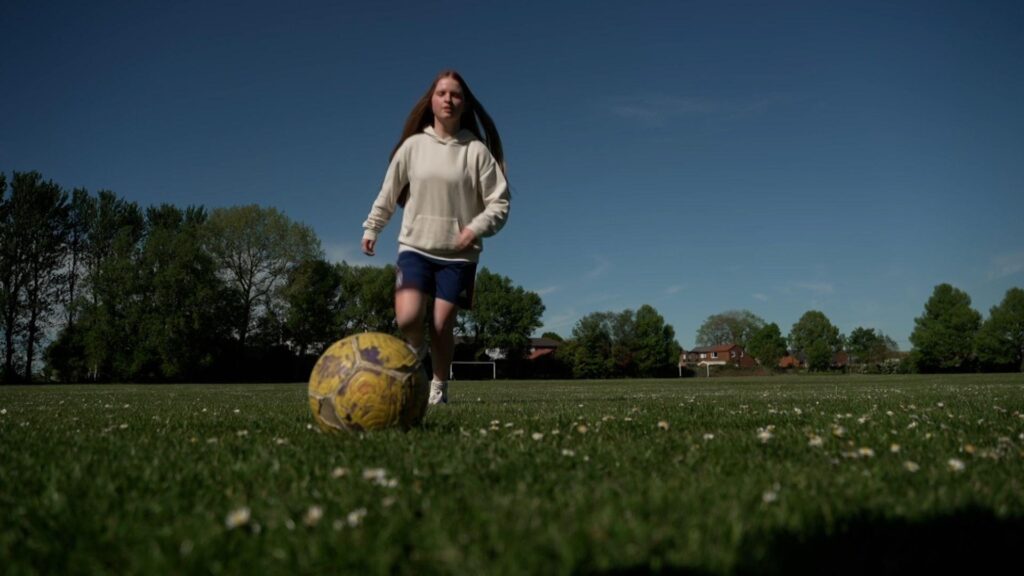**Footballer Banned for Trans Comment Seeks Apology from FA**
In recent news, Cerys Vaughan, an 18-year-old amateur footballer who faced a ban from the Football Association (FA) due to comments made during a match against a transgender opponent, is now demanding an official apology from the governing body. The case, which began last year when Vaughan was just 17, has reportedly taken a toll on her personal life, raising questions about the FA’s disciplinary processes and policies pertaining to transgender athletes.
**Background of the Incident**
The incident that led to Vaughan’s ban occurred during a pre-season friendly in Lancashire in July 2024. During the match, she noticed a player on the opposing team who she perceived to be male. Out of curiosity, she asked, “Are you a man?” After learning that the player was, in fact, transgender, Vaughan raised her concerns about the fairness and safety of the match with the referee. Her actions were deemed inappropriate by the FA, leading to a formal complaint and a subsequent disciplinary hearing that resulted in a six-match ban, four of which were suspended.
The case garnered significant media attention and sparked protests from women’s rights activists outside Wembley Stadium, as it highlighted the contentious nature of the FA’s gender eligibility policies. Many began scrutinizing how the FA handles such sensitive matters, especially in the context of trans inclusion in sports.
**Appeal and Aftermath**
In February 2025, the FA’s appeal board acknowledged that Vaughan had not received a fair hearing. The board quashed the original ruling, ruling that there were not enough comprehensive measures in place to ensure Vaughan could effectively present her side of the story during the initial proceedings. Following this revelation, the complaint was eventually dropped after the initial complainant withdrew from the process.
In a recent interview with BBC Sport, Vaughan expressed relief that the case had been dismissed but voiced her frustration over the ordeal, stating, “It was pointless… there was no reason for the FA to put me through all this.” She feels vindicated by the FA’s implementation of a new ban on transgender women participating in women’s football, which aligns with recent legal rulings that emphasize biological sex.
**Responses and Reactions**
While Vaughan feels validated in her perspective, she is also seeking acknowledgment for how she was treated during the process. “I’d like the FA to apologise for the way that they treated me,” she stated, drawing support from many who share her concerns regarding fairness in women’s sports.
Although the FA’s decision to amend its policies has been welcomed by some, including individuals who argue about safety and competitive fairness, it has also raised alarms about the implications it holds for the approximately 28 registered transgender athletes in English football. Critics, such as Natalie Washington from the campaign group Football v Transphobia, argue that this new policy effectively bans transgender women from competitive play, marginalizing a community that already faces significant challenges.
Vaughan herself has shared her views on this controversy, stating that she does not feel sympathy for transgender women potentially excluded from the sport due to the new policy changes. She believes that the physical advantages conferred by male puberty create an unequal playing field, stating, “I’m at a greater risk of injury,” and that the inclusion of “biological males” can alter the integrity of women’s sports.
FA Chief Executive Mark Bullingham defended the policy change as a challenging yet necessary decision based on legal advice, acknowledging the broad implications it could have on the athletes who identify as a different gender.
In conclusion, Cerys Vaughan’s case has amplified the ongoing debate surrounding gender identity and inclusion in sports, touching upon vital aspects of fairness, safety, and the complex dynamics of transgender athletes’ participation in competitive sports. As discussions continue, Vaughan’s call for an apology underlines the importance of communication and understanding within both the governing bodies of sports and the communities they serve.



